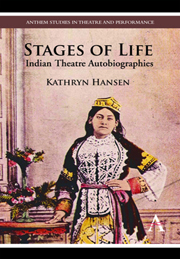Book contents
- Frontmatter
- Contents
- Illustrations
- Preface
- Acknowledgments
- PART 1
- PART 2
- 3 Narayan Prasad Betab, The Deeds of Betab
- 4 Radheshyam Kathavachak, My Theatre Days
- 5 Jayshankar Sundari, Some Blossoms, Some Tears
- 6 Fida Husain, Fifty Years in the Parsi Theatre
- PART 3
- Appendix 1 Historical Personages and Institutions
- Appendix 2 List of Plays and Films
- Glossary: Hindi and Urdu Terms
- Bibliography
- Index
3 - Narayan Prasad Betab, The Deeds of Betab
from PART 2
Published online by Cambridge University Press: 05 March 2012
- Frontmatter
- Contents
- Illustrations
- Preface
- Acknowledgments
- PART 1
- PART 2
- 3 Narayan Prasad Betab, The Deeds of Betab
- 4 Radheshyam Kathavachak, My Theatre Days
- 5 Jayshankar Sundari, Some Blossoms, Some Tears
- 6 Fida Husain, Fifty Years in the Parsi Theatre
- PART 3
- Appendix 1 Historical Personages and Institutions
- Appendix 2 List of Plays and Films
- Glossary: Hindi and Urdu Terms
- Bibliography
- Index
Summary
Introduction
The poet-playwright Narayan Prasad “Betab” lived through an extraordinary time. During the course of his days, modernity seeped into the fabric of small-town society through the channels of religious reform, caste mobilization, and public entertainment. The movement for India's independence drew diverse sectors into a common anti-colonial struggle, and increasingly Hindi, not Hindustani or Urdu, became its mouthpiece. Betab's career was punctuated by the large shifts occurring around him. After a brief period composing folk verse, he sought training as a poet of Urdu ghazals. He used that language to compose social melodramas, Shakespearean adaptations, and Indo-Islamic romances in his first decade as a playwright. Coming under the influence of the Arya Samaj, his orientation then switched toward Hindi and the Hindu mythological genre, which culminated in his influential version of the Mahabharat. While interpreting the epic within the frames of nationalism and reformist Hinduism, in this drama he also articulated the strivings of low-caste groups and championed untouchables.
Betab's rags-to-riches tale, The Deeds of Betab, voices the restless yearning for opportunity that must have seized many a youth from his bleak background. Not only is his the earliest autobiography we have from the Parsi theatre, it sketches the starkest scenes of deprivation. His memoir also documents clearly the rising fortunes of a pushy, provincial writer. Betab's mythological dramas earned huge profits for his employers, the Bombay Parsi theatre's Alfred Company and Madan Theatres of Calcutta.
- Type
- Chapter
- Information
- Stages of LifeIndian Theatre Autobiographies, pp. 51 - 101Publisher: Anthem PressPrint publication year: 2011

